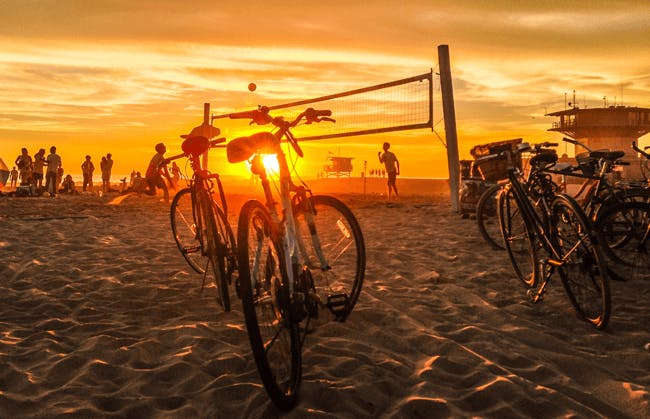
Any real Californian will tell you: It’s more than just a state for sunshine, beaches and gnarly waves. Those are certainly some of the more attractive features of California, but the reality is that life in California is unlike life anywhere else. It has a certain laid-back, leisurely appeal and it’s filled with people who are lively, energetic and welcoming. But all Californians know that the good life sometimes comes at a price. Sometimes that price is the occasional earthquake. Other times, it’s a mudslide, a forest fire or ridiculous housing prices. Perhaps it’s a divine attempt at forcing humility on an otherwise perfect place to live. Nonetheless, preparing is important no matter where you live and this guide includes everything you need to know to stay safe in California.
Home Security Provider Requirements for California
Beyond the natural disasters which you can sometimes prevent and predict, there are other, man-made disasters which carry a significant amount of unpredictability. In particular, home burglaries are among the most common disasters that affect families in California. The “Eureka” state has the most burglaries of any state in the country, seconded only by Texas. They say everything’s bigger in Texas, but in this case, California comes out on top. Home security systems have existed for decades for exactly this reason. They’re like a big “Do Not Enter” sign right in front of your home telling the bad guys that entering your place is a pretty bad idea.
The California State Government has certain rules in place for companies that sell home security systems. They must all be licensed by the state, and those licenses must cover three specific areas:
Selling alarm systems on a buyer’s premises.
Installing, servicing, repairing and monitoring these alarms.
Responding to alarms.
In addition, all contracts you make with any security system company in California must dictate that the company teaches you how to use your system, and includes scheduled payments if the agreed cost is more than $250 dollars.
What this really means is that any company selling you an alarm system in the state of California is agreeing, by law, that they are qualified and capable of protecting your home, whether you are there or not, and that your service will not suddenly disappear without your knowing it. That said, please (with extremely heavy emphasis on the please here) read your contract! While it should be a bit comforting to know that the state government has your back at times, different companies sell different products and for different term lengths. And–surprise, surprise–these companies are not always honest. Some companies like to nestle in hidden charges to the contract and extra fees that could see you spending more money than you expected. ADT, for example, was required to pay a nearly $1 million civil penalty to some customers after a lawsuit in 2012 brought by a state District Attorney. The company was found guilty of violating the Unruh Act, which dictates that all contract changes must be disclosed to the customer. In this case, ADT was hiking rates on 2 and 3 year contracts after the first year. This may have something to do with why ADT sells 2-year contracts in California, but 3-year contracts in other states. While there is no law that dictates lower term contracts in California, the overall openness of the contract laws in the state help provide some protection from shady business dealings.
California is pretty liberal with home security cameras. You’re likely in the clear, as long as you don’t misuse the footage. Seriously. You can rest easy with the security cameras. To date, there are no laws against putting up security cameras to guard your home. In a way, even the physical sight of a camera might be a good guard against would-be burglars. However, there are laws, both state and constitutional, that do protect rights to privacy. Your home surveillance camera will only violate someone’s privacy rights if:
Its recording is somehow an intrusion (say, pointing it directly at a neighbor’s window).
It intrudes in a location or context where there is a reasonable expectation of privacy (see above).
It outweighs other interests by the gravity of the alleged violation (again, see #1).
In essence, as long as you’re using your home security cameras to surveil and not snoop on your sunbathing neighbors, you’re likely in the clear.
Other Important Safety Measures for Californians
Natural Disasters
As beautiful as California is, it is prone to some of the worst natural disasters known to man. In fact, the California Department of Health lists 7 possible natural disasters for the state: earthquakes, floods, wildfires, landslides and mudslides, tsunamis, power outages and extreme heat. Scared yet? Don’t worry too much. If you’re lucky, you’ll only experience a few of these in your lifetime. But with so many possible disasters, you will experience at least one of them, even if your stint in California is short lived (of course, we all know that once you move to California, you’re there to stay!). Landslides, mudslides, wildfires, earthquakes and tsunamis in particular can be extremely devastating, especially for homeowners. For these, some preparation is needed. Having an evacuation plan in order is essential for any natural disaster that can affect your safety in your home. It’s certainly a better alternative to running around and screaming with your hands thrown above your head! Absolute chaos, in the cartoonishly humorous sense, is definitely avoidable. A good plan–one you can easily make yourself, no less–should include having emergency numbers, planned routes for escape and especially palatable food and drinkable water that can be carried with you should you need to evacuate your home quickly.
EARTHQUAKES
California and earthquakes go hand-in-hand sometimes. If you are in your home, you will need to take cover making sure to protect your head and neck. While you shouldn’t try to leave your house during a quake, you will need to ensure that you have an exit plan that includes two ways out of your house. This is especially important in case of fire. This plan should also include a meet-up plan so that you can connect with your family once you are away from the building. For an earthquake near your home, be just a bit wary of things such as gas smells. This could be indicative of a broken gas line, and the danger of explosion is very real and very severe. We’re not trying to scare you, of course, but a gas leak may result in you needing to change your meeting place to a location that is further away from your home.
Landslides, Mudslides, Wildfires
Landslides, mudslides and wildfires require a bit of a different safety approach. For landslides and mudslides, you’ll want to leave the surfboard at home. Instead, be conscious of the fact that you will be dealing with very fast moving debris and water. If you get caught in one, escape can be difficult, if not impossible. If you live near steep slopes or rivers and streams, your home could be right in the zone for a dangerous mudslide or landslide. Some clear signs do exist that a landslide or mudslide could be imminent. This includes trees or telephone poles ready to limbo following heavy rains, as well as a rumbling sound or feeling. A wildfire will likewise require escape from your home, but you may not always be in its path. Having a water hose ready is very important, but do know that if a wildfire does make its way to your home, you will not be able to fend it off with only a garden hose. For many, the biggest concern for a wildfire will be the smoke. Smoke from a wildfire can stretch for many miles, and impact you even if your home is not in the danger zone. Keep windows up, doors closed and invest in high quality air filters and surgical masks that can help block out particulates in the air. It is also best to ensure that your car is ready in a position that makes evacuation quick and easy if necessary.
Staying safe in California is a mixture of smart thinking and smart planning. But then, most Californians are already smart thinkers and smart planners anyway. But no matter how prepared you are, it never hurts to ask yourself a few questions every now and then. Do you have emergency rations? Extra, potable water? An escape route? Is your home secure? Is your security system setup to protect you from both burglaries and natural disasters? Disaster can strike in any number of ways. But few people are better at staving off disaster–or meeting it head on–than Californians.

